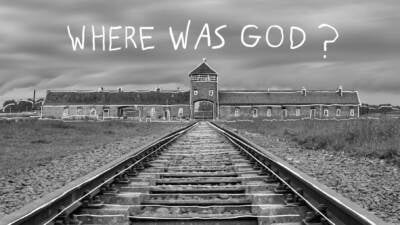Do you think the Holocaust represented a failure of humanity?
Humanity and the Holocaust (Topic 2, part 1)
Share
In April 2020, to coincide with Yom HaShoah, the day in the Jewish calendar dedicated to Holocaust remembrance, and the 75th anniversary of the liberation, Rabbi Sacks launched a series of videos offering his perspective on some of the biggest questions asked about the Holocaust.
The Holocaust represented perhaps the greatest failure humanity has ever known. It featured the combination of technical brilliance and bureaucratic efficiency, but dedicated to the most evil of all purposes. This really is the greatest failure of humanity that I can think of.
In the 19th century, educated people, whether they were Hegel in philosophy or Darwin in biology, or anthropologists, were all convinced that humanity evolves, that humanity climbs a ladder of excellence and civilisation. They believed in the newer, the better, that everything that is old is primitive, and that was a fatal act of hubris on the part of humanity. They thought they knew better than all previous generations and they didn’t realise that they were carrying with them the old demons of fear and resentment and hate and desire for revenge.
The 18th century was a century of reason and peace but the 19th century was a century of nationalism, racism, and ideological warfare of the most horrendous kind and hubris did lead to nemesis. When human beings think they are more than human, they end up by being less than human.
Don’t forget it was in 1879, I think, that Nietzsche said for the first time, “God is dead and we have killed Him” and a mere 60 years later, people were busy trying to exterminate the people of God. That’s what happens if you think you know better than all previous generations; you sink to the lowest depths.

This series, created in partnership with the Holocaust Educational Trust, has been made possible thanks to the generous support of Richard Harris.
More Holocaust Curriculum Resources

Faith After the Holocaust
Rabbi Sacks responds to the devastation of the Holocaust

Where can you find hope in the history of the Holocaust?
Hope and the Holocaust (Topic 10)

How does the Holocaust impact interfaith relations today?
Interfaith Relations and the Holocaust (Topic 9)

How do you connect the Holocaust with the establishment of the State of Israel?
Israel and the Holocaust (Topic 8)

Do you think it’s ever possible to forgive the perpetrators of the Holocaust?
Forgiveness and the Holocaust (Topic 6)

What is the difference between vengeance and justice?
Jewish Theology and the Holocaust (Topic 5, part 3)

What about a statute of limitations?
Just Punishment and the Holocaust (Topic 5, part 2)

A Just Punishment for the Nazis?
Just Punishment and the Holocaust (Topic 5, part 1)

Does God care about individual lives, or merely the survival of the Jewish people as a nation?
God and the Holocaust (Topic 1, part 3)

Do you have faith in humanity after the Holocaust?
God and the Holocaust (Topic 1, part 2)

Where was God during the Holocaust?
God and the Holocaust (Topic 1, part 1)

What is theologically unique about the Holocaust?
Jewish Identity and the Holocaust (Topic 7, part 3)

Practically speaking, is there something unique about the Holocaust?
Jewish Identity and the Holocaust (Topic 7, part 2)

Should a Jewish theological response to the Holocaust include issues of justice?
Jewish Theology and the Holocaust (Topic 3, part 2)

Should the Holocaust be a key ingredient of our Jewish identity?
Jewish Identity and the Holocaust (Topic 7, part 1)

How has the Holocaust impacted your personal relationship with God?
Personal Faith and the Holocaust (Topic 4)

What do you think the Jewish theological response to the Holocaust should be?
Jewish Theology and the Holocaust (Topic 3, part 1)

How can I have faith that God is within each of us if I mistrust humanity?
Humanity and the Holocaust (Topic 2, part 3)

Can we trust people other than ourselves?
Humanity and the Holocaust (Topic 2, part 2)
